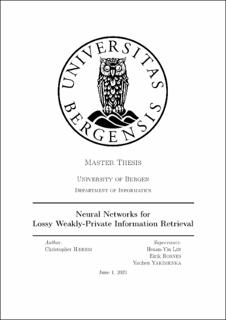Neural Networks for Lossy Weakly-Private Information Retrieval
Master thesis
Permanent lenke
https://hdl.handle.net/11250/2761231Utgivelsesdato
2021-06-01Metadata
Vis full innførselSamlinger
- Master theses [197]
Sammendrag
The availability of information through public accessible databases has never beengreater, but do raise privacy concerns. Private information retrieval schemes guar-antees full privacy regarding the servers ability to infer what the user retrieved,but are highly unpractical for single server purposes since the only scheme is down-loading the entire database. By allowing some leakage regarding what file the userretrieved to the server, and some distortion between the original and received file,Lossy Weakly-Private Information Retrieval (LWPIR) schemes manage to improvethe download rate while still preserving some degree of privacy. Optimal LWPIRschemes are found by numerically solving a constrained optimization problem giventhe distribution of the data. However, when the distribution is unknown it is in-teresting to consider a data-driven approach leveraging recent advancements forGenerative Adverserial Nets (GANs). GANs have proven useful for similar appli-cations such as in Generative Adversarial Privacy (GAP). This thesis explores thisopportunity, first by implementing the GAP model and validating its results, andthen secondly by implementing a new LWPIR model with the goal of finding LW-PIR schemes. Achieved results for the GAP and LWPIR model are plotted againstthe theoretical optimal ones with the conclusion that, even though training of themodels is challenging, there is great potential in using neural networks for LWPIR.
